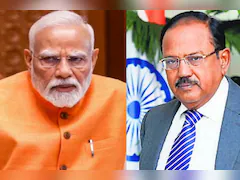As tensions rise over Pakistan’s escalating terror activities, top security analyst Michael Rubin has recommended that Prime Minister Narendra Modi should take a page from Israel’s approach to terrorism, particularly from the actions of former Israeli PM Golda Meir. According to Rubin, India’s long-term strategy should emulate Israel’s commitment to relentlessly pursue and eliminate terrorists, no matter the cost.
Lessons from Israel’s Response to the Munich Massacre
The suggestion draws a parallel with Israel’s response to the 1972 Munich Olympic massacre, where 11 Israeli athletes were killed by Palestinian terrorists. In the aftermath, Israel’s government, led by Golda Meir, took a decisive stance. Over the course of seven years, the Israeli government utilized covert operations to track down and eliminate those responsible for the massacre. This relentless pursuit, known as Operation Wrath of God, was not just a response to a single attack but part of a broader, long-term strategy aimed at sending a clear message to those who would target Israeli citizens.
Rubin believes that India, particularly under PM Modi’s leadership, should adopt a similar long-term commitment to hunting down terrorists linked to Pakistan’s proxy terror groups. PM Modi’s remarks following the terror attack in Kashmir’s Pahalgam in which 26 civilians were killed by Pakistan-linked terrorists echo Golda Meir’s pledge: “India will go to the ends of the Earth to hunt down terrorists and their backers.”
Operation Sindoor: India’s Calculated Response to Terrorism

Amid Pakistan’s consistent support for terror groups like Lashkar-e-Taiba, India’s Operation Sindoor has been a crucial part of its military strategy. However, Rubin suggests that the long-term success of India’s counterterrorism efforts depends on more than just immediate military responses. He emphasizes that while military operations like Operation Sindoor are necessary, they must be part of a broader, relentless strategy aimed at the root causes of cross-border terrorism.
As India carefully weighs its response to Pakistan’s actions, Rubin warns that a pattern of intermittent military escalation and diplomatic negotiations will not break the cycle of terrorism. He draws a direct parallel to Israel’s challenges, noting how attacks on Israel’s civilians led to a series of terror responses, culminating in the more recent October 7, 2023, attacks, highlighting the cyclical nature of terrorism. For more on Israel’s counterterrorism strategy, see CNN’s analysis on Israel’s counterterrorism efforts.
Global Diplomacy and Terrorism: A Delicate Balance
Beyond military strategies, Rubin discusses the delicate balance India must strike between global diplomacy and combating terrorism. As international pressure builds, especially with regard to Pakistan’s role as a state sponsor of terrorism, India must ensure its actions do not undermine diplomatic efforts. “While diplomats scramble for quiet, the terrorists regroup to strategize,” Rubin points out, referring to the cyclical patterns observed in the Middle East and South Asia.
In the end, Rubin concludes that India’s efforts in combating terrorism should not be reactive but proactive, ensuring that terrorist elements are eliminated systematically and without pause, much like Israel’s actions following the Munich massacre. This could signal a shift in India’s long-term strategy in dealing with Pakistan’s terror network.
Conclusion
In light of the increasing threats posed by cross-border terrorism, especially from Pakistan, PM Modi has the opportunity to emulate Golda Meir’s unyielding commitment to confronting terror. While India has shown remarkable restraint in its measured responses, a continued focus on long-term, comprehensive strategies will be essential to break the cycle of terror and safeguard national security.
What are your thoughts on this strategy? Can India afford to implement such a long-term plan?









